Treatment Plan: Analyzing Olivia Pepper's Alcohol Abuse and Depression
VerifiedAdded on 2021/02/19
|11
|3808
|584
Report
AI Summary
This report presents a comprehensive treatment plan for Olivia Pepper, a 30-year-old woman suffering from alcohol abuse and depression. The report begins with Olivia's demographic information, including her history of alcohol use, previous treatments, and erratic behaviors observed by her professor. The analysis uses DSM-5 to diagnose her condition, highlighting the criteria for alcohol use disorder and depressive disorders. The report explores the assessments utilized for diagnosis, including discussions with Olivia, physical examinations, and psychological evaluations. It then delves into the mental health theories applied, such as Motivational Enhancement Therapy and marital/family counseling. The treatment interventions include verbalizing feelings, medication, and therapeutic activities. The report also discusses Olivia's strengths and weaknesses, social support, and short-term and long-term goals, which involve addressing her depression, improving family relationships, and reducing alcohol consumption to achieve overall well-being.
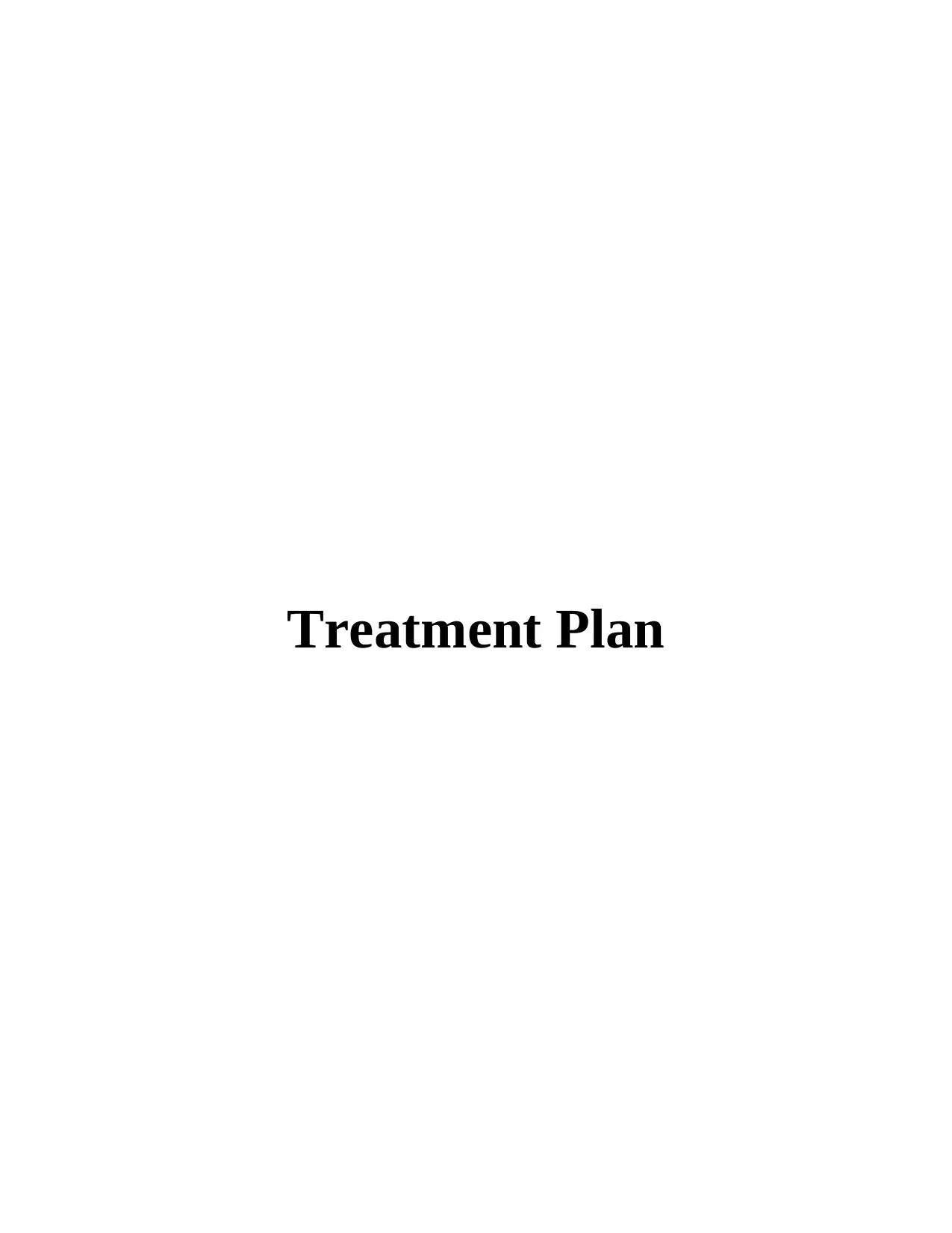
Treatment Plan
Paraphrase This Document
Need a fresh take? Get an instant paraphrase of this document with our AI Paraphraser
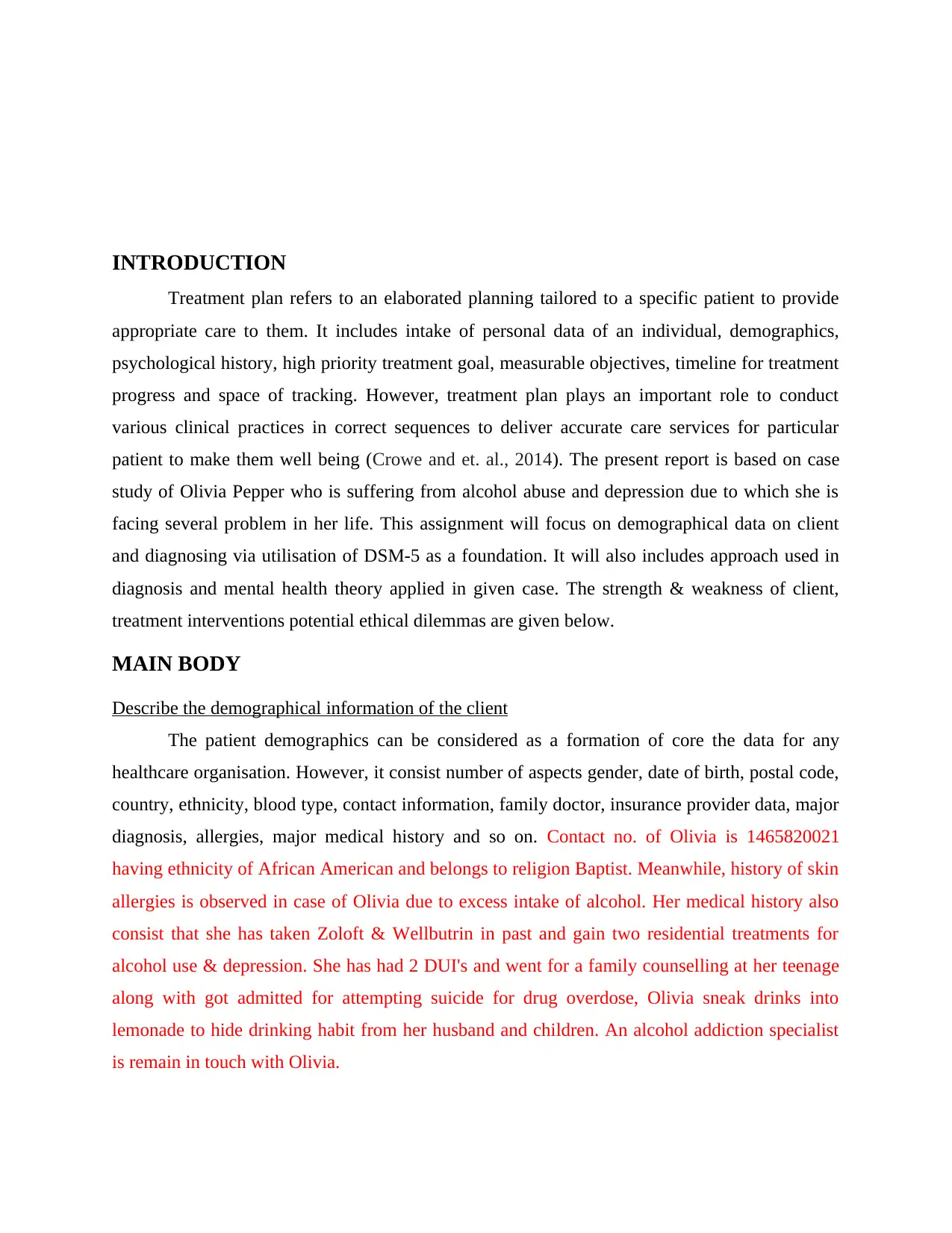
INTRODUCTION
Treatment plan refers to an elaborated planning tailored to a specific patient to provide
appropriate care to them. It includes intake of personal data of an individual, demographics,
psychological history, high priority treatment goal, measurable objectives, timeline for treatment
progress and space of tracking. However, treatment plan plays an important role to conduct
various clinical practices in correct sequences to deliver accurate care services for particular
patient to make them well being (Crowe and et. al., 2014). The present report is based on case
study of Olivia Pepper who is suffering from alcohol abuse and depression due to which she is
facing several problem in her life. This assignment will focus on demographical data on client
and diagnosing via utilisation of DSM-5 as a foundation. It will also includes approach used in
diagnosis and mental health theory applied in given case. The strength & weakness of client,
treatment interventions potential ethical dilemmas are given below.
MAIN BODY
Describe the demographical information of the client
The patient demographics can be considered as a formation of core the data for any
healthcare organisation. However, it consist number of aspects gender, date of birth, postal code,
country, ethnicity, blood type, contact information, family doctor, insurance provider data, major
diagnosis, allergies, major medical history and so on. Contact no. of Olivia is 1465820021
having ethnicity of African American and belongs to religion Baptist. Meanwhile, history of skin
allergies is observed in case of Olivia due to excess intake of alcohol. Her medical history also
consist that she has taken Zoloft & Wellbutrin in past and gain two residential treatments for
alcohol use & depression. She has had 2 DUI's and went for a family counselling at her teenage
along with got admitted for attempting suicide for drug overdose, Olivia sneak drinks into
lemonade to hide drinking habit from her husband and children. An alcohol addiction specialist
is remain in touch with Olivia.
Treatment plan refers to an elaborated planning tailored to a specific patient to provide
appropriate care to them. It includes intake of personal data of an individual, demographics,
psychological history, high priority treatment goal, measurable objectives, timeline for treatment
progress and space of tracking. However, treatment plan plays an important role to conduct
various clinical practices in correct sequences to deliver accurate care services for particular
patient to make them well being (Crowe and et. al., 2014). The present report is based on case
study of Olivia Pepper who is suffering from alcohol abuse and depression due to which she is
facing several problem in her life. This assignment will focus on demographical data on client
and diagnosing via utilisation of DSM-5 as a foundation. It will also includes approach used in
diagnosis and mental health theory applied in given case. The strength & weakness of client,
treatment interventions potential ethical dilemmas are given below.
MAIN BODY
Describe the demographical information of the client
The patient demographics can be considered as a formation of core the data for any
healthcare organisation. However, it consist number of aspects gender, date of birth, postal code,
country, ethnicity, blood type, contact information, family doctor, insurance provider data, major
diagnosis, allergies, major medical history and so on. Contact no. of Olivia is 1465820021
having ethnicity of African American and belongs to religion Baptist. Meanwhile, history of skin
allergies is observed in case of Olivia due to excess intake of alcohol. Her medical history also
consist that she has taken Zoloft & Wellbutrin in past and gain two residential treatments for
alcohol use & depression. She has had 2 DUI's and went for a family counselling at her teenage
along with got admitted for attempting suicide for drug overdose, Olivia sneak drinks into
lemonade to hide drinking habit from her husband and children. An alcohol addiction specialist
is remain in touch with Olivia.
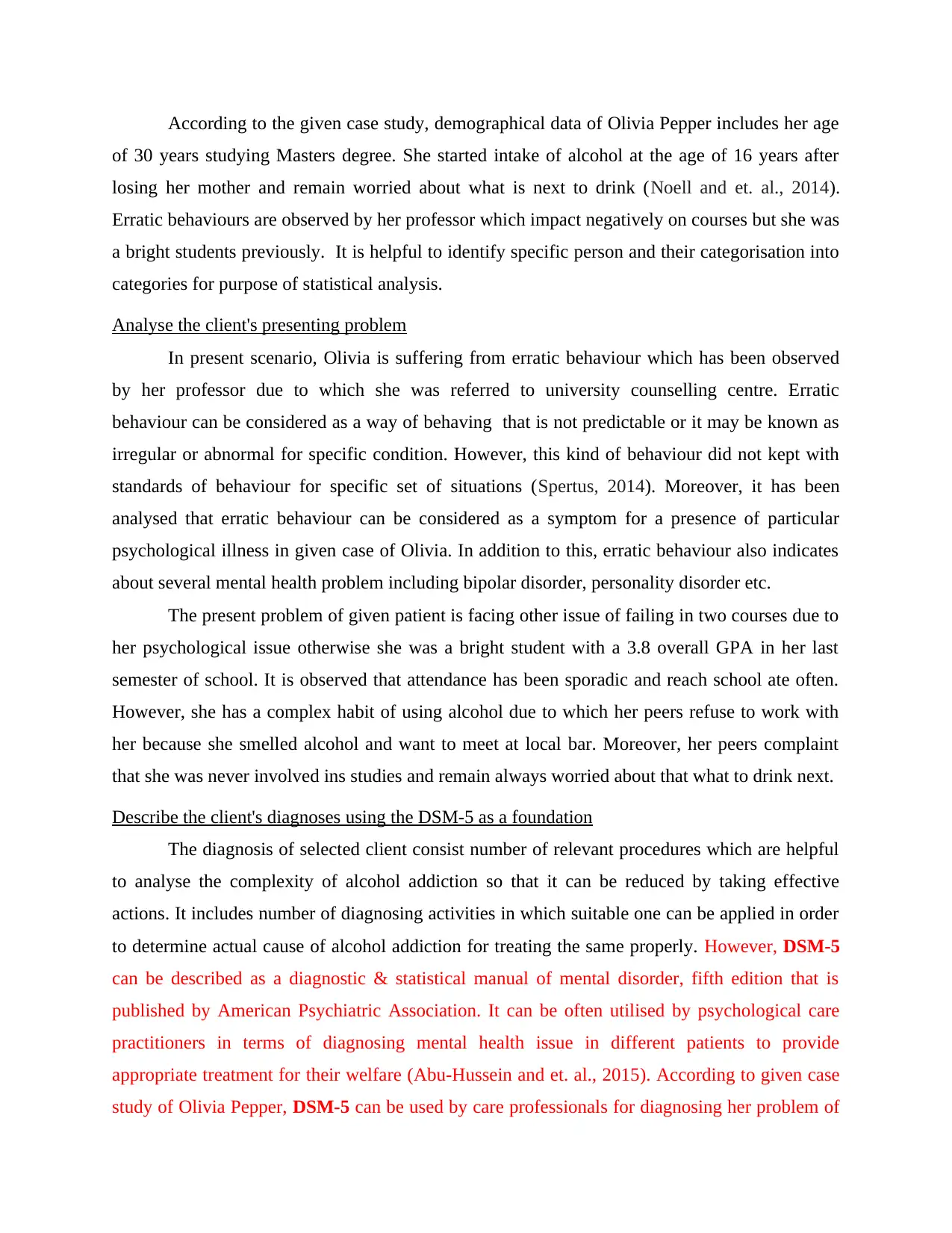
According to the given case study, demographical data of Olivia Pepper includes her age
of 30 years studying Masters degree. She started intake of alcohol at the age of 16 years after
losing her mother and remain worried about what is next to drink (Noell and et. al., 2014).
Erratic behaviours are observed by her professor which impact negatively on courses but she was
a bright students previously. It is helpful to identify specific person and their categorisation into
categories for purpose of statistical analysis.
Analyse the client's presenting problem
In present scenario, Olivia is suffering from erratic behaviour which has been observed
by her professor due to which she was referred to university counselling centre. Erratic
behaviour can be considered as a way of behaving that is not predictable or it may be known as
irregular or abnormal for specific condition. However, this kind of behaviour did not kept with
standards of behaviour for specific set of situations (Spertus, 2014). Moreover, it has been
analysed that erratic behaviour can be considered as a symptom for a presence of particular
psychological illness in given case of Olivia. In addition to this, erratic behaviour also indicates
about several mental health problem including bipolar disorder, personality disorder etc.
The present problem of given patient is facing other issue of failing in two courses due to
her psychological issue otherwise she was a bright student with a 3.8 overall GPA in her last
semester of school. It is observed that attendance has been sporadic and reach school ate often.
However, she has a complex habit of using alcohol due to which her peers refuse to work with
her because she smelled alcohol and want to meet at local bar. Moreover, her peers complaint
that she was never involved ins studies and remain always worried about that what to drink next.
Describe the client's diagnoses using the DSM-5 as a foundation
The diagnosis of selected client consist number of relevant procedures which are helpful
to analyse the complexity of alcohol addiction so that it can be reduced by taking effective
actions. It includes number of diagnosing activities in which suitable one can be applied in order
to determine actual cause of alcohol addiction for treating the same properly. However, DSM-5
can be described as a diagnostic & statistical manual of mental disorder, fifth edition that is
published by American Psychiatric Association. It can be often utilised by psychological care
practitioners in terms of diagnosing mental health issue in different patients to provide
appropriate treatment for their welfare (Abu-Hussein and et. al., 2015). According to given case
study of Olivia Pepper, DSM-5 can be used by care professionals for diagnosing her problem of
of 30 years studying Masters degree. She started intake of alcohol at the age of 16 years after
losing her mother and remain worried about what is next to drink (Noell and et. al., 2014).
Erratic behaviours are observed by her professor which impact negatively on courses but she was
a bright students previously. It is helpful to identify specific person and their categorisation into
categories for purpose of statistical analysis.
Analyse the client's presenting problem
In present scenario, Olivia is suffering from erratic behaviour which has been observed
by her professor due to which she was referred to university counselling centre. Erratic
behaviour can be considered as a way of behaving that is not predictable or it may be known as
irregular or abnormal for specific condition. However, this kind of behaviour did not kept with
standards of behaviour for specific set of situations (Spertus, 2014). Moreover, it has been
analysed that erratic behaviour can be considered as a symptom for a presence of particular
psychological illness in given case of Olivia. In addition to this, erratic behaviour also indicates
about several mental health problem including bipolar disorder, personality disorder etc.
The present problem of given patient is facing other issue of failing in two courses due to
her psychological issue otherwise she was a bright student with a 3.8 overall GPA in her last
semester of school. It is observed that attendance has been sporadic and reach school ate often.
However, she has a complex habit of using alcohol due to which her peers refuse to work with
her because she smelled alcohol and want to meet at local bar. Moreover, her peers complaint
that she was never involved ins studies and remain always worried about that what to drink next.
Describe the client's diagnoses using the DSM-5 as a foundation
The diagnosis of selected client consist number of relevant procedures which are helpful
to analyse the complexity of alcohol addiction so that it can be reduced by taking effective
actions. It includes number of diagnosing activities in which suitable one can be applied in order
to determine actual cause of alcohol addiction for treating the same properly. However, DSM-5
can be described as a diagnostic & statistical manual of mental disorder, fifth edition that is
published by American Psychiatric Association. It can be often utilised by psychological care
practitioners in terms of diagnosing mental health issue in different patients to provide
appropriate treatment for their welfare (Abu-Hussein and et. al., 2015). According to given case
study of Olivia Pepper, DSM-5 can be used by care professionals for diagnosing her problem of
⊘ This is a preview!⊘
Do you want full access?
Subscribe today to unlock all pages.

Trusted by 1+ million students worldwide
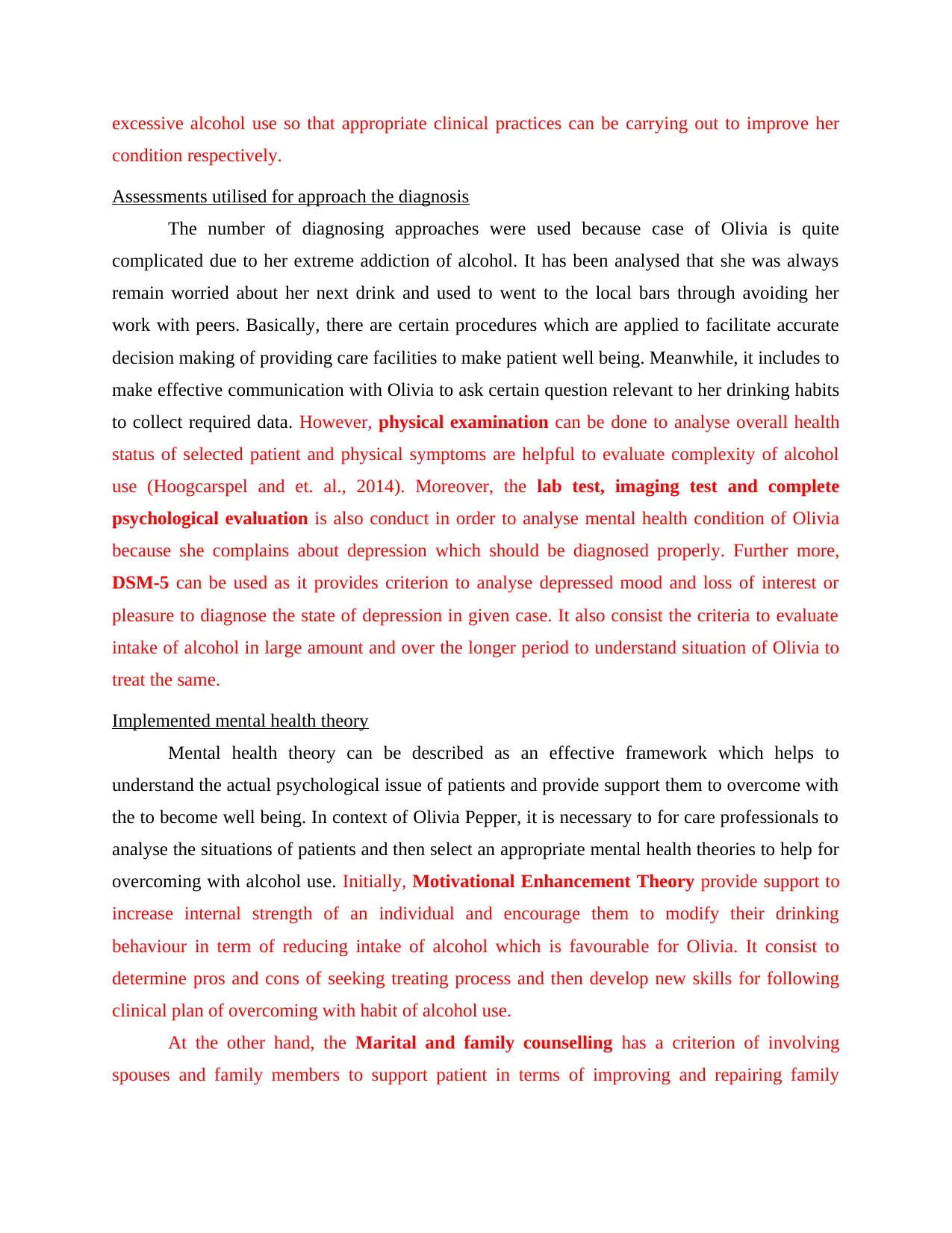
excessive alcohol use so that appropriate clinical practices can be carrying out to improve her
condition respectively.
Assessments utilised for approach the diagnosis
The number of diagnosing approaches were used because case of Olivia is quite
complicated due to her extreme addiction of alcohol. It has been analysed that she was always
remain worried about her next drink and used to went to the local bars through avoiding her
work with peers. Basically, there are certain procedures which are applied to facilitate accurate
decision making of providing care facilities to make patient well being. Meanwhile, it includes to
make effective communication with Olivia to ask certain question relevant to her drinking habits
to collect required data. However, physical examination can be done to analyse overall health
status of selected patient and physical symptoms are helpful to evaluate complexity of alcohol
use (Hoogcarspel and et. al., 2014). Moreover, the lab test, imaging test and complete
psychological evaluation is also conduct in order to analyse mental health condition of Olivia
because she complains about depression which should be diagnosed properly. Further more,
DSM-5 can be used as it provides criterion to analyse depressed mood and loss of interest or
pleasure to diagnose the state of depression in given case. It also consist the criteria to evaluate
intake of alcohol in large amount and over the longer period to understand situation of Olivia to
treat the same.
Implemented mental health theory
Mental health theory can be described as an effective framework which helps to
understand the actual psychological issue of patients and provide support them to overcome with
the to become well being. In context of Olivia Pepper, it is necessary to for care professionals to
analyse the situations of patients and then select an appropriate mental health theories to help for
overcoming with alcohol use. Initially, Motivational Enhancement Theory provide support to
increase internal strength of an individual and encourage them to modify their drinking
behaviour in term of reducing intake of alcohol which is favourable for Olivia. It consist to
determine pros and cons of seeking treating process and then develop new skills for following
clinical plan of overcoming with habit of alcohol use.
At the other hand, the Marital and family counselling has a criterion of involving
spouses and family members to support patient in terms of improving and repairing family
condition respectively.
Assessments utilised for approach the diagnosis
The number of diagnosing approaches were used because case of Olivia is quite
complicated due to her extreme addiction of alcohol. It has been analysed that she was always
remain worried about her next drink and used to went to the local bars through avoiding her
work with peers. Basically, there are certain procedures which are applied to facilitate accurate
decision making of providing care facilities to make patient well being. Meanwhile, it includes to
make effective communication with Olivia to ask certain question relevant to her drinking habits
to collect required data. However, physical examination can be done to analyse overall health
status of selected patient and physical symptoms are helpful to evaluate complexity of alcohol
use (Hoogcarspel and et. al., 2014). Moreover, the lab test, imaging test and complete
psychological evaluation is also conduct in order to analyse mental health condition of Olivia
because she complains about depression which should be diagnosed properly. Further more,
DSM-5 can be used as it provides criterion to analyse depressed mood and loss of interest or
pleasure to diagnose the state of depression in given case. It also consist the criteria to evaluate
intake of alcohol in large amount and over the longer period to understand situation of Olivia to
treat the same.
Implemented mental health theory
Mental health theory can be described as an effective framework which helps to
understand the actual psychological issue of patients and provide support them to overcome with
the to become well being. In context of Olivia Pepper, it is necessary to for care professionals to
analyse the situations of patients and then select an appropriate mental health theories to help for
overcoming with alcohol use. Initially, Motivational Enhancement Theory provide support to
increase internal strength of an individual and encourage them to modify their drinking
behaviour in term of reducing intake of alcohol which is favourable for Olivia. It consist to
determine pros and cons of seeking treating process and then develop new skills for following
clinical plan of overcoming with habit of alcohol use.
At the other hand, the Marital and family counselling has a criterion of involving
spouses and family members to support patient in terms of improving and repairing family
Paraphrase This Document
Need a fresh take? Get an instant paraphrase of this document with our AI Paraphraser
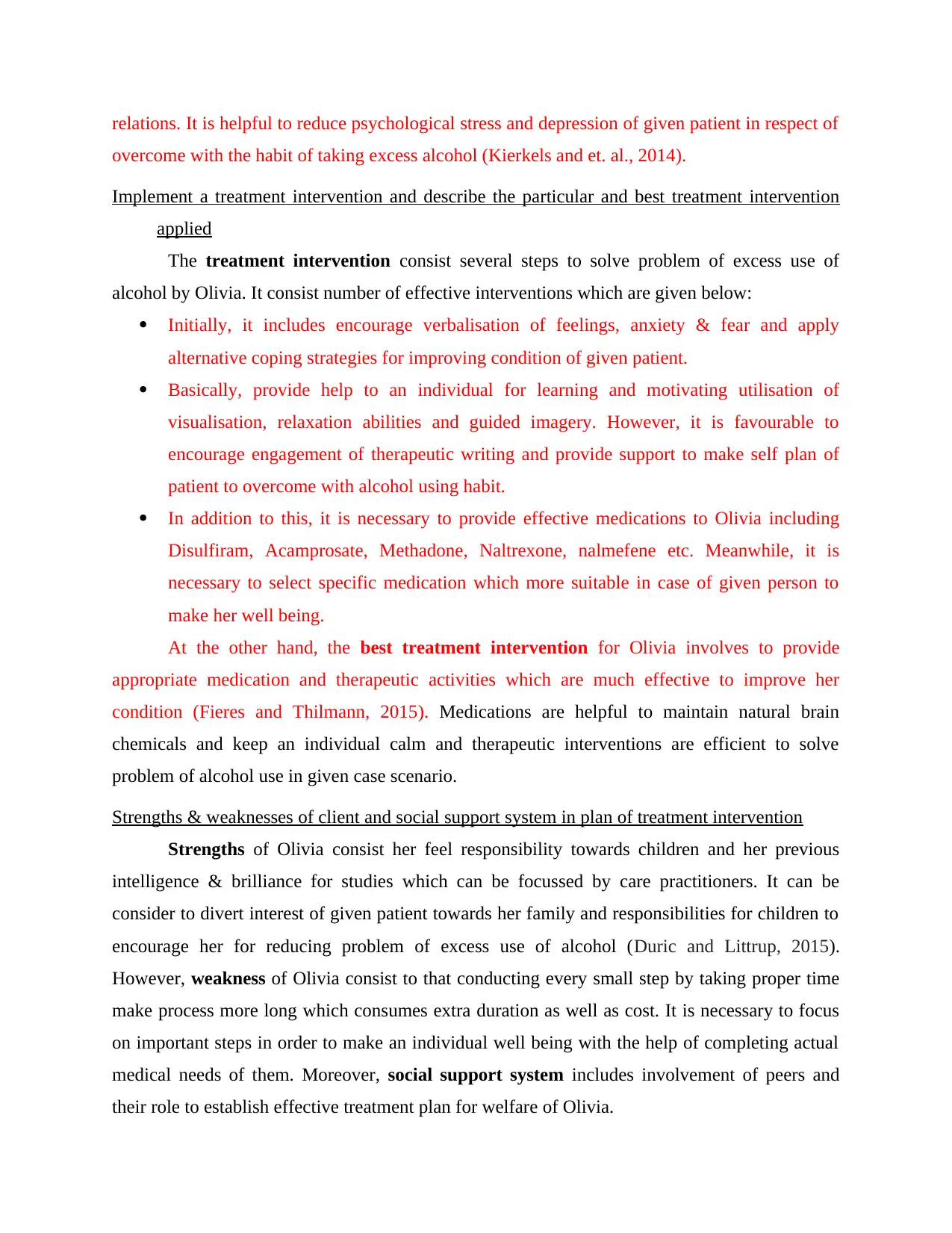
relations. It is helpful to reduce psychological stress and depression of given patient in respect of
overcome with the habit of taking excess alcohol (Kierkels and et. al., 2014).
Implement a treatment intervention and describe the particular and best treatment intervention
applied
The treatment intervention consist several steps to solve problem of excess use of
alcohol by Olivia. It consist number of effective interventions which are given below:
Initially, it includes encourage verbalisation of feelings, anxiety & fear and apply
alternative coping strategies for improving condition of given patient.
Basically, provide help to an individual for learning and motivating utilisation of
visualisation, relaxation abilities and guided imagery. However, it is favourable to
encourage engagement of therapeutic writing and provide support to make self plan of
patient to overcome with alcohol using habit.
In addition to this, it is necessary to provide effective medications to Olivia including
Disulfiram, Acamprosate, Methadone, Naltrexone, nalmefene etc. Meanwhile, it is
necessary to select specific medication which more suitable in case of given person to
make her well being.
At the other hand, the best treatment intervention for Olivia involves to provide
appropriate medication and therapeutic activities which are much effective to improve her
condition (Fieres and Thilmann, 2015). Medications are helpful to maintain natural brain
chemicals and keep an individual calm and therapeutic interventions are efficient to solve
problem of alcohol use in given case scenario.
Strengths & weaknesses of client and social support system in plan of treatment intervention
Strengths of Olivia consist her feel responsibility towards children and her previous
intelligence & brilliance for studies which can be focussed by care practitioners. It can be
consider to divert interest of given patient towards her family and responsibilities for children to
encourage her for reducing problem of excess use of alcohol (Duric and Littrup, 2015).
However, weakness of Olivia consist to that conducting every small step by taking proper time
make process more long which consumes extra duration as well as cost. It is necessary to focus
on important steps in order to make an individual well being with the help of completing actual
medical needs of them. Moreover, social support system includes involvement of peers and
their role to establish effective treatment plan for welfare of Olivia.
overcome with the habit of taking excess alcohol (Kierkels and et. al., 2014).
Implement a treatment intervention and describe the particular and best treatment intervention
applied
The treatment intervention consist several steps to solve problem of excess use of
alcohol by Olivia. It consist number of effective interventions which are given below:
Initially, it includes encourage verbalisation of feelings, anxiety & fear and apply
alternative coping strategies for improving condition of given patient.
Basically, provide help to an individual for learning and motivating utilisation of
visualisation, relaxation abilities and guided imagery. However, it is favourable to
encourage engagement of therapeutic writing and provide support to make self plan of
patient to overcome with alcohol using habit.
In addition to this, it is necessary to provide effective medications to Olivia including
Disulfiram, Acamprosate, Methadone, Naltrexone, nalmefene etc. Meanwhile, it is
necessary to select specific medication which more suitable in case of given person to
make her well being.
At the other hand, the best treatment intervention for Olivia involves to provide
appropriate medication and therapeutic activities which are much effective to improve her
condition (Fieres and Thilmann, 2015). Medications are helpful to maintain natural brain
chemicals and keep an individual calm and therapeutic interventions are efficient to solve
problem of alcohol use in given case scenario.
Strengths & weaknesses of client and social support system in plan of treatment intervention
Strengths of Olivia consist her feel responsibility towards children and her previous
intelligence & brilliance for studies which can be focussed by care practitioners. It can be
consider to divert interest of given patient towards her family and responsibilities for children to
encourage her for reducing problem of excess use of alcohol (Duric and Littrup, 2015).
However, weakness of Olivia consist to that conducting every small step by taking proper time
make process more long which consumes extra duration as well as cost. It is necessary to focus
on important steps in order to make an individual well being with the help of completing actual
medical needs of them. Moreover, social support system includes involvement of peers and
their role to establish effective treatment plan for welfare of Olivia.
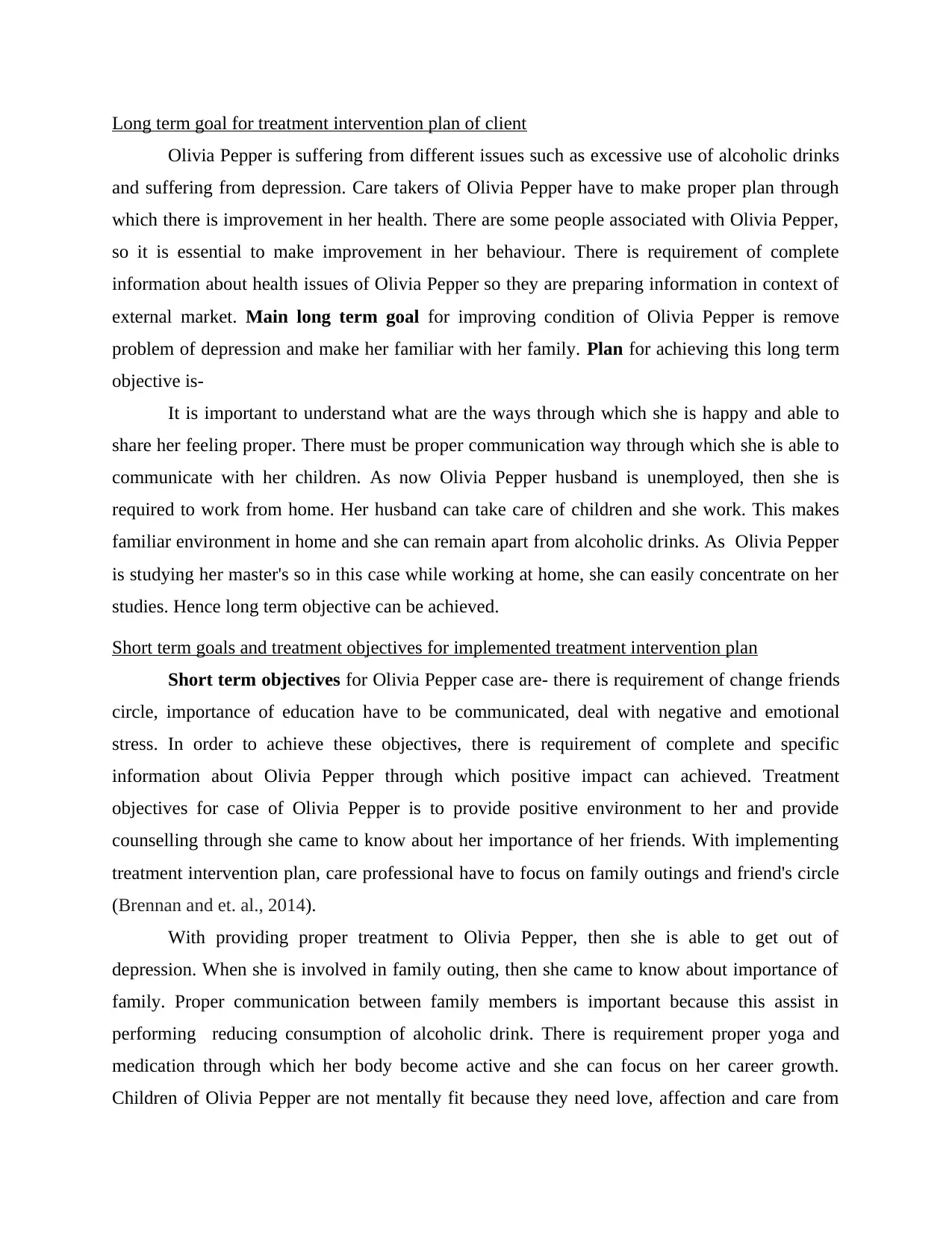
Long term goal for treatment intervention plan of client
Olivia Pepper is suffering from different issues such as excessive use of alcoholic drinks
and suffering from depression. Care takers of Olivia Pepper have to make proper plan through
which there is improvement in her health. There are some people associated with Olivia Pepper,
so it is essential to make improvement in her behaviour. There is requirement of complete
information about health issues of Olivia Pepper so they are preparing information in context of
external market. Main long term goal for improving condition of Olivia Pepper is remove
problem of depression and make her familiar with her family. Plan for achieving this long term
objective is-
It is important to understand what are the ways through which she is happy and able to
share her feeling proper. There must be proper communication way through which she is able to
communicate with her children. As now Olivia Pepper husband is unemployed, then she is
required to work from home. Her husband can take care of children and she work. This makes
familiar environment in home and she can remain apart from alcoholic drinks. As Olivia Pepper
is studying her master's so in this case while working at home, she can easily concentrate on her
studies. Hence long term objective can be achieved.
Short term goals and treatment objectives for implemented treatment intervention plan
Short term objectives for Olivia Pepper case are- there is requirement of change friends
circle, importance of education have to be communicated, deal with negative and emotional
stress. In order to achieve these objectives, there is requirement of complete and specific
information about Olivia Pepper through which positive impact can achieved. Treatment
objectives for case of Olivia Pepper is to provide positive environment to her and provide
counselling through she came to know about her importance of her friends. With implementing
treatment intervention plan, care professional have to focus on family outings and friend's circle
(Brennan and et. al., 2014).
With providing proper treatment to Olivia Pepper, then she is able to get out of
depression. When she is involved in family outing, then she came to know about importance of
family. Proper communication between family members is important because this assist in
performing reducing consumption of alcoholic drink. There is requirement proper yoga and
medication through which her body become active and she can focus on her career growth.
Children of Olivia Pepper are not mentally fit because they need love, affection and care from
Olivia Pepper is suffering from different issues such as excessive use of alcoholic drinks
and suffering from depression. Care takers of Olivia Pepper have to make proper plan through
which there is improvement in her health. There are some people associated with Olivia Pepper,
so it is essential to make improvement in her behaviour. There is requirement of complete
information about health issues of Olivia Pepper so they are preparing information in context of
external market. Main long term goal for improving condition of Olivia Pepper is remove
problem of depression and make her familiar with her family. Plan for achieving this long term
objective is-
It is important to understand what are the ways through which she is happy and able to
share her feeling proper. There must be proper communication way through which she is able to
communicate with her children. As now Olivia Pepper husband is unemployed, then she is
required to work from home. Her husband can take care of children and she work. This makes
familiar environment in home and she can remain apart from alcoholic drinks. As Olivia Pepper
is studying her master's so in this case while working at home, she can easily concentrate on her
studies. Hence long term objective can be achieved.
Short term goals and treatment objectives for implemented treatment intervention plan
Short term objectives for Olivia Pepper case are- there is requirement of change friends
circle, importance of education have to be communicated, deal with negative and emotional
stress. In order to achieve these objectives, there is requirement of complete and specific
information about Olivia Pepper through which positive impact can achieved. Treatment
objectives for case of Olivia Pepper is to provide positive environment to her and provide
counselling through she came to know about her importance of her friends. With implementing
treatment intervention plan, care professional have to focus on family outings and friend's circle
(Brennan and et. al., 2014).
With providing proper treatment to Olivia Pepper, then she is able to get out of
depression. When she is involved in family outing, then she came to know about importance of
family. Proper communication between family members is important because this assist in
performing reducing consumption of alcoholic drink. There is requirement proper yoga and
medication through which her body become active and she can focus on her career growth.
Children of Olivia Pepper are not mentally fit because they need love, affection and care from
⊘ This is a preview!⊘
Do you want full access?
Subscribe today to unlock all pages.

Trusted by 1+ million students worldwide
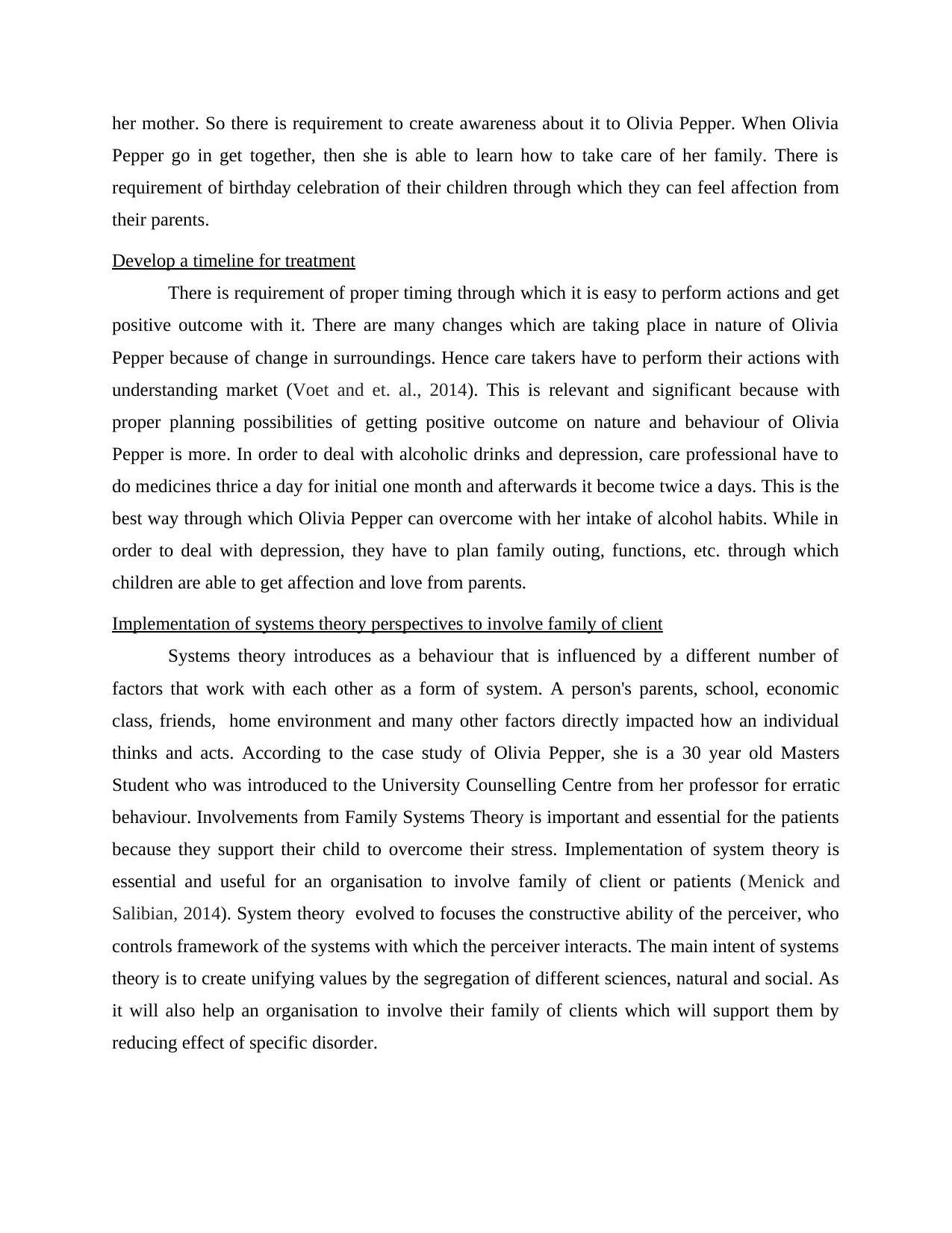
her mother. So there is requirement to create awareness about it to Olivia Pepper. When Olivia
Pepper go in get together, then she is able to learn how to take care of her family. There is
requirement of birthday celebration of their children through which they can feel affection from
their parents.
Develop a timeline for treatment
There is requirement of proper timing through which it is easy to perform actions and get
positive outcome with it. There are many changes which are taking place in nature of Olivia
Pepper because of change in surroundings. Hence care takers have to perform their actions with
understanding market (Voet and et. al., 2014). This is relevant and significant because with
proper planning possibilities of getting positive outcome on nature and behaviour of Olivia
Pepper is more. In order to deal with alcoholic drinks and depression, care professional have to
do medicines thrice a day for initial one month and afterwards it become twice a days. This is the
best way through which Olivia Pepper can overcome with her intake of alcohol habits. While in
order to deal with depression, they have to plan family outing, functions, etc. through which
children are able to get affection and love from parents.
Implementation of systems theory perspectives to involve family of client
Systems theory introduces as a behaviour that is influenced by a different number of
factors that work with each other as a form of system. A person's parents, school, economic
class, friends, home environment and many other factors directly impacted how an individual
thinks and acts. According to the case study of Olivia Pepper, she is a 30 year old Masters
Student who was introduced to the University Counselling Centre from her professor for erratic
behaviour. Involvements from Family Systems Theory is important and essential for the patients
because they support their child to overcome their stress. Implementation of system theory is
essential and useful for an organisation to involve family of client or patients (Menick and
Salibian, 2014). System theory evolved to focuses the constructive ability of the perceiver, who
controls framework of the systems with which the perceiver interacts. The main intent of systems
theory is to create unifying values by the segregation of different sciences, natural and social. As
it will also help an organisation to involve their family of clients which will support them by
reducing effect of specific disorder.
Pepper go in get together, then she is able to learn how to take care of her family. There is
requirement of birthday celebration of their children through which they can feel affection from
their parents.
Develop a timeline for treatment
There is requirement of proper timing through which it is easy to perform actions and get
positive outcome with it. There are many changes which are taking place in nature of Olivia
Pepper because of change in surroundings. Hence care takers have to perform their actions with
understanding market (Voet and et. al., 2014). This is relevant and significant because with
proper planning possibilities of getting positive outcome on nature and behaviour of Olivia
Pepper is more. In order to deal with alcoholic drinks and depression, care professional have to
do medicines thrice a day for initial one month and afterwards it become twice a days. This is the
best way through which Olivia Pepper can overcome with her intake of alcohol habits. While in
order to deal with depression, they have to plan family outing, functions, etc. through which
children are able to get affection and love from parents.
Implementation of systems theory perspectives to involve family of client
Systems theory introduces as a behaviour that is influenced by a different number of
factors that work with each other as a form of system. A person's parents, school, economic
class, friends, home environment and many other factors directly impacted how an individual
thinks and acts. According to the case study of Olivia Pepper, she is a 30 year old Masters
Student who was introduced to the University Counselling Centre from her professor for erratic
behaviour. Involvements from Family Systems Theory is important and essential for the patients
because they support their child to overcome their stress. Implementation of system theory is
essential and useful for an organisation to involve family of client or patients (Menick and
Salibian, 2014). System theory evolved to focuses the constructive ability of the perceiver, who
controls framework of the systems with which the perceiver interacts. The main intent of systems
theory is to create unifying values by the segregation of different sciences, natural and social. As
it will also help an organisation to involve their family of clients which will support them by
reducing effect of specific disorder.
Paraphrase This Document
Need a fresh take? Get an instant paraphrase of this document with our AI Paraphraser
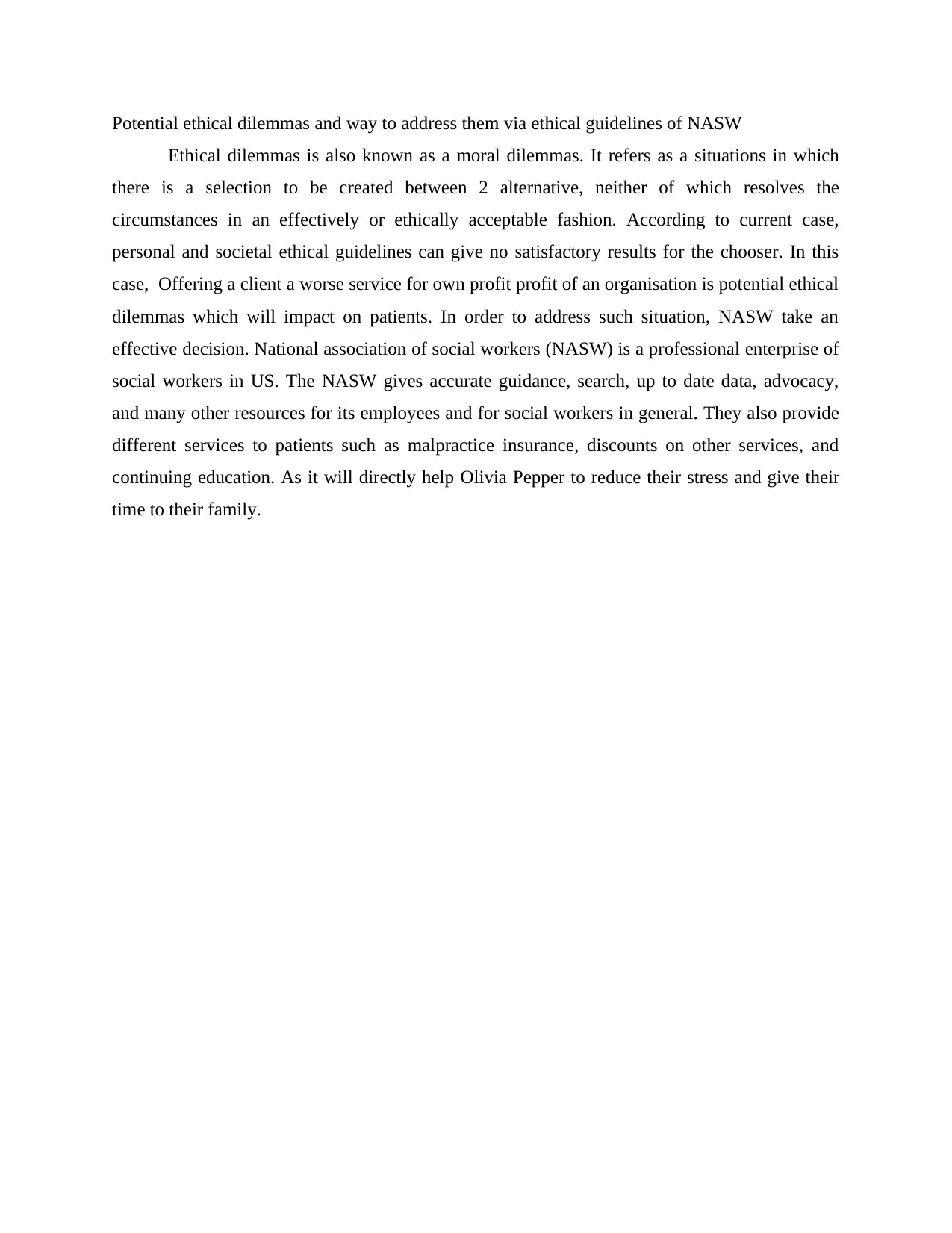
Potential ethical dilemmas and way to address them via ethical guidelines of NASW
Ethical dilemmas is also known as a moral dilemmas. It refers as a situations in which
there is a selection to be created between 2 alternative, neither of which resolves the
circumstances in an effectively or ethically acceptable fashion. According to current case,
personal and societal ethical guidelines can give no satisfactory results for the chooser. In this
case, Offering a client a worse service for own profit profit of an organisation is potential ethical
dilemmas which will impact on patients. In order to address such situation, NASW take an
effective decision. National association of social workers (NASW) is a professional enterprise of
social workers in US. The NASW gives accurate guidance, search, up to date data, advocacy,
and many other resources for its employees and for social workers in general. They also provide
different services to patients such as malpractice insurance, discounts on other services, and
continuing education. As it will directly help Olivia Pepper to reduce their stress and give their
time to their family.
Ethical dilemmas is also known as a moral dilemmas. It refers as a situations in which
there is a selection to be created between 2 alternative, neither of which resolves the
circumstances in an effectively or ethically acceptable fashion. According to current case,
personal and societal ethical guidelines can give no satisfactory results for the chooser. In this
case, Offering a client a worse service for own profit profit of an organisation is potential ethical
dilemmas which will impact on patients. In order to address such situation, NASW take an
effective decision. National association of social workers (NASW) is a professional enterprise of
social workers in US. The NASW gives accurate guidance, search, up to date data, advocacy,
and many other resources for its employees and for social workers in general. They also provide
different services to patients such as malpractice insurance, discounts on other services, and
continuing education. As it will directly help Olivia Pepper to reduce their stress and give their
time to their family.
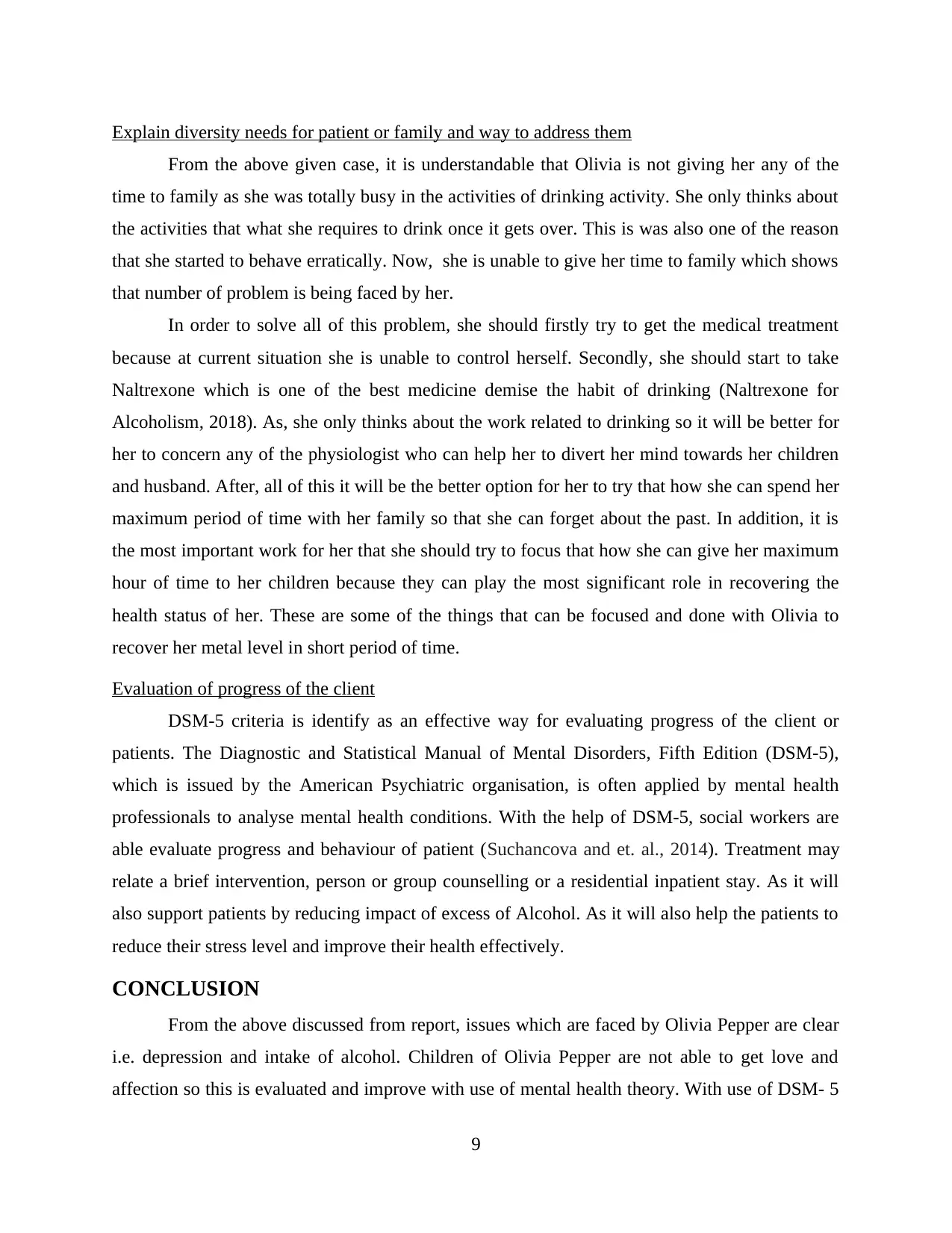
Explain diversity needs for patient or family and way to address them
From the above given case, it is understandable that Olivia is not giving her any of the
time to family as she was totally busy in the activities of drinking activity. She only thinks about
the activities that what she requires to drink once it gets over. This is was also one of the reason
that she started to behave erratically. Now, she is unable to give her time to family which shows
that number of problem is being faced by her.
In order to solve all of this problem, she should firstly try to get the medical treatment
because at current situation she is unable to control herself. Secondly, she should start to take
Naltrexone which is one of the best medicine demise the habit of drinking (Naltrexone for
Alcoholism, 2018). As, she only thinks about the work related to drinking so it will be better for
her to concern any of the physiologist who can help her to divert her mind towards her children
and husband. After, all of this it will be the better option for her to try that how she can spend her
maximum period of time with her family so that she can forget about the past. In addition, it is
the most important work for her that she should try to focus that how she can give her maximum
hour of time to her children because they can play the most significant role in recovering the
health status of her. These are some of the things that can be focused and done with Olivia to
recover her metal level in short period of time.
Evaluation of progress of the client
DSM-5 criteria is identify as an effective way for evaluating progress of the client or
patients. The Diagnostic and Statistical Manual of Mental Disorders, Fifth Edition (DSM-5),
which is issued by the American Psychiatric organisation, is often applied by mental health
professionals to analyse mental health conditions. With the help of DSM-5, social workers are
able evaluate progress and behaviour of patient (Suchancova and et. al., 2014). Treatment may
relate a brief intervention, person or group counselling or a residential inpatient stay. As it will
also support patients by reducing impact of excess of Alcohol. As it will also help the patients to
reduce their stress level and improve their health effectively.
CONCLUSION
From the above discussed from report, issues which are faced by Olivia Pepper are clear
i.e. depression and intake of alcohol. Children of Olivia Pepper are not able to get love and
affection so this is evaluated and improve with use of mental health theory. With use of DSM- 5
9
From the above given case, it is understandable that Olivia is not giving her any of the
time to family as she was totally busy in the activities of drinking activity. She only thinks about
the activities that what she requires to drink once it gets over. This is was also one of the reason
that she started to behave erratically. Now, she is unable to give her time to family which shows
that number of problem is being faced by her.
In order to solve all of this problem, she should firstly try to get the medical treatment
because at current situation she is unable to control herself. Secondly, she should start to take
Naltrexone which is one of the best medicine demise the habit of drinking (Naltrexone for
Alcoholism, 2018). As, she only thinks about the work related to drinking so it will be better for
her to concern any of the physiologist who can help her to divert her mind towards her children
and husband. After, all of this it will be the better option for her to try that how she can spend her
maximum period of time with her family so that she can forget about the past. In addition, it is
the most important work for her that she should try to focus that how she can give her maximum
hour of time to her children because they can play the most significant role in recovering the
health status of her. These are some of the things that can be focused and done with Olivia to
recover her metal level in short period of time.
Evaluation of progress of the client
DSM-5 criteria is identify as an effective way for evaluating progress of the client or
patients. The Diagnostic and Statistical Manual of Mental Disorders, Fifth Edition (DSM-5),
which is issued by the American Psychiatric organisation, is often applied by mental health
professionals to analyse mental health conditions. With the help of DSM-5, social workers are
able evaluate progress and behaviour of patient (Suchancova and et. al., 2014). Treatment may
relate a brief intervention, person or group counselling or a residential inpatient stay. As it will
also support patients by reducing impact of excess of Alcohol. As it will also help the patients to
reduce their stress level and improve their health effectively.
CONCLUSION
From the above discussed from report, issues which are faced by Olivia Pepper are clear
i.e. depression and intake of alcohol. Children of Olivia Pepper are not able to get love and
affection so this is evaluated and improve with use of mental health theory. With use of DSM- 5
9
⊘ This is a preview!⊘
Do you want full access?
Subscribe today to unlock all pages.

Trusted by 1+ million students worldwide
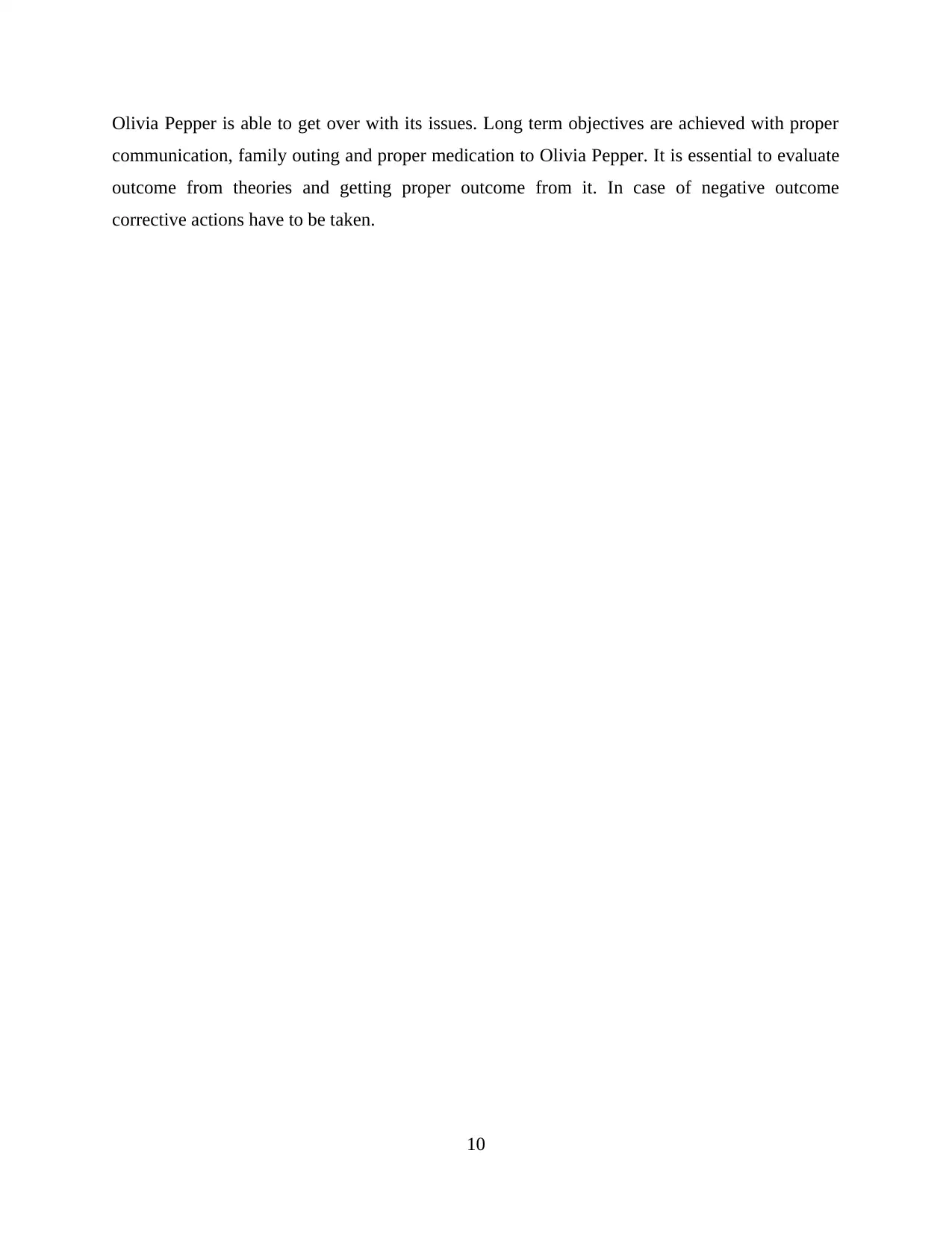
Olivia Pepper is able to get over with its issues. Long term objectives are achieved with proper
communication, family outing and proper medication to Olivia Pepper. It is essential to evaluate
outcome from theories and getting proper outcome from it. In case of negative outcome
corrective actions have to be taken.
10
communication, family outing and proper medication to Olivia Pepper. It is essential to evaluate
outcome from theories and getting proper outcome from it. In case of negative outcome
corrective actions have to be taken.
10
Paraphrase This Document
Need a fresh take? Get an instant paraphrase of this document with our AI Paraphraser
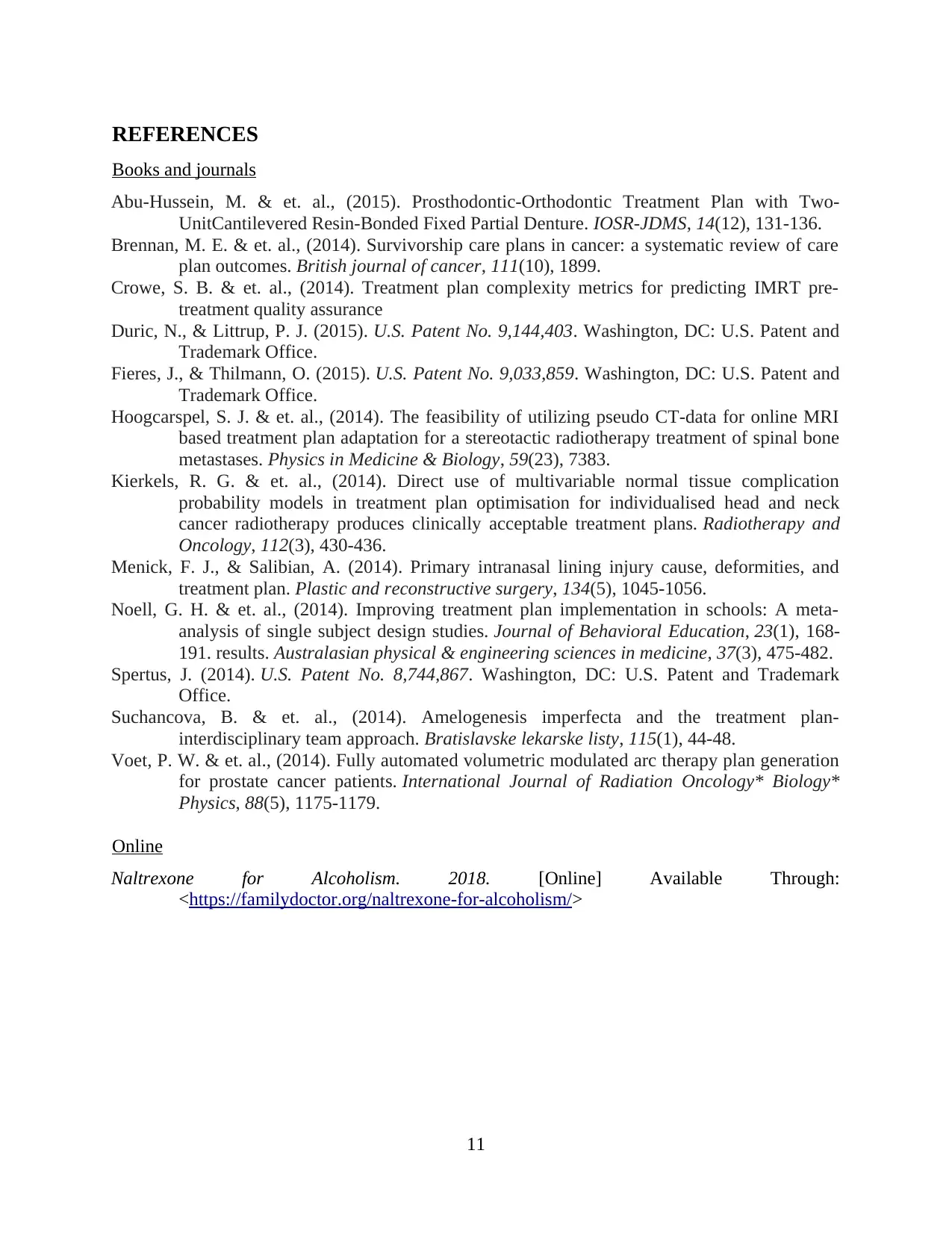
REFERENCES
Books and journals
Abu-Hussein, M. & et. al., (2015). Prosthodontic-Orthodontic Treatment Plan with Two-
UnitCantilevered Resin-Bonded Fixed Partial Denture. IOSR-JDMS, 14(12), 131-136.
Brennan, M. E. & et. al., (2014). Survivorship care plans in cancer: a systematic review of care
plan outcomes. British journal of cancer, 111(10), 1899.
Crowe, S. B. & et. al., (2014). Treatment plan complexity metrics for predicting IMRT pre-
treatment quality assurance
Duric, N., & Littrup, P. J. (2015). U.S. Patent No. 9,144,403. Washington, DC: U.S. Patent and
Trademark Office.
Fieres, J., & Thilmann, O. (2015). U.S. Patent No. 9,033,859. Washington, DC: U.S. Patent and
Trademark Office.
Hoogcarspel, S. J. & et. al., (2014). The feasibility of utilizing pseudo CT-data for online MRI
based treatment plan adaptation for a stereotactic radiotherapy treatment of spinal bone
metastases. Physics in Medicine & Biology, 59(23), 7383.
Kierkels, R. G. & et. al., (2014). Direct use of multivariable normal tissue complication
probability models in treatment plan optimisation for individualised head and neck
cancer radiotherapy produces clinically acceptable treatment plans. Radiotherapy and
Oncology, 112(3), 430-436.
Menick, F. J., & Salibian, A. (2014). Primary intranasal lining injury cause, deformities, and
treatment plan. Plastic and reconstructive surgery, 134(5), 1045-1056.
Noell, G. H. & et. al., (2014). Improving treatment plan implementation in schools: A meta-
analysis of single subject design studies. Journal of Behavioral Education, 23(1), 168-
191. results. Australasian physical & engineering sciences in medicine, 37(3), 475-482.
Spertus, J. (2014). U.S. Patent No. 8,744,867. Washington, DC: U.S. Patent and Trademark
Office.
Suchancova, B. & et. al., (2014). Amelogenesis imperfecta and the treatment plan-
interdisciplinary team approach. Bratislavske lekarske listy, 115(1), 44-48.
Voet, P. W. & et. al., (2014). Fully automated volumetric modulated arc therapy plan generation
for prostate cancer patients. International Journal of Radiation Oncology* Biology*
Physics, 88(5), 1175-1179.
Online
Naltrexone for Alcoholism. 2018. [Online] Available Through:
<https://familydoctor.org/naltrexone-for-alcoholism/>
11
Books and journals
Abu-Hussein, M. & et. al., (2015). Prosthodontic-Orthodontic Treatment Plan with Two-
UnitCantilevered Resin-Bonded Fixed Partial Denture. IOSR-JDMS, 14(12), 131-136.
Brennan, M. E. & et. al., (2014). Survivorship care plans in cancer: a systematic review of care
plan outcomes. British journal of cancer, 111(10), 1899.
Crowe, S. B. & et. al., (2014). Treatment plan complexity metrics for predicting IMRT pre-
treatment quality assurance
Duric, N., & Littrup, P. J. (2015). U.S. Patent No. 9,144,403. Washington, DC: U.S. Patent and
Trademark Office.
Fieres, J., & Thilmann, O. (2015). U.S. Patent No. 9,033,859. Washington, DC: U.S. Patent and
Trademark Office.
Hoogcarspel, S. J. & et. al., (2014). The feasibility of utilizing pseudo CT-data for online MRI
based treatment plan adaptation for a stereotactic radiotherapy treatment of spinal bone
metastases. Physics in Medicine & Biology, 59(23), 7383.
Kierkels, R. G. & et. al., (2014). Direct use of multivariable normal tissue complication
probability models in treatment plan optimisation for individualised head and neck
cancer radiotherapy produces clinically acceptable treatment plans. Radiotherapy and
Oncology, 112(3), 430-436.
Menick, F. J., & Salibian, A. (2014). Primary intranasal lining injury cause, deformities, and
treatment plan. Plastic and reconstructive surgery, 134(5), 1045-1056.
Noell, G. H. & et. al., (2014). Improving treatment plan implementation in schools: A meta-
analysis of single subject design studies. Journal of Behavioral Education, 23(1), 168-
191. results. Australasian physical & engineering sciences in medicine, 37(3), 475-482.
Spertus, J. (2014). U.S. Patent No. 8,744,867. Washington, DC: U.S. Patent and Trademark
Office.
Suchancova, B. & et. al., (2014). Amelogenesis imperfecta and the treatment plan-
interdisciplinary team approach. Bratislavske lekarske listy, 115(1), 44-48.
Voet, P. W. & et. al., (2014). Fully automated volumetric modulated arc therapy plan generation
for prostate cancer patients. International Journal of Radiation Oncology* Biology*
Physics, 88(5), 1175-1179.
Online
Naltrexone for Alcoholism. 2018. [Online] Available Through:
<https://familydoctor.org/naltrexone-for-alcoholism/>
11
1 out of 11
Related Documents
Your All-in-One AI-Powered Toolkit for Academic Success.
+13062052269
info@desklib.com
Available 24*7 on WhatsApp / Email
![[object Object]](/_next/static/media/star-bottom.7253800d.svg)
Unlock your academic potential
Copyright © 2020–2026 A2Z Services. All Rights Reserved. Developed and managed by ZUCOL.



